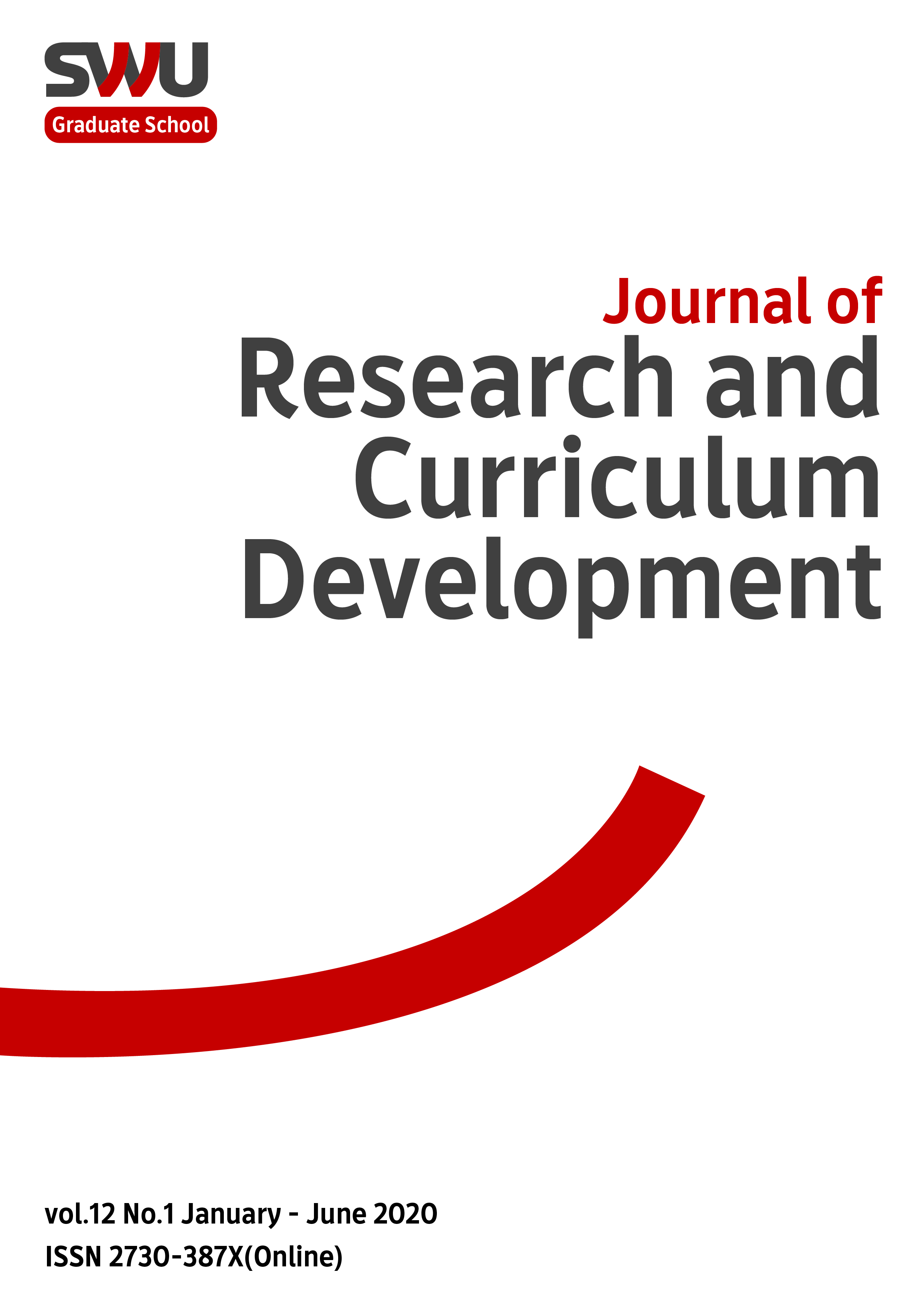Effectiveness of a Growth Mindset Counseling Program to Enhance Student Resilience in a Public Autonomous University in Thailand
Keywords:
Resilience, Growth mindset counseling program, Student resilience, Public autonomous universityAbstract
Resilience is one of the protective factors that supports individuals during adversity and recovery. This study was to investigate the effectiveness of the counseling program with a growth mindset focused on psychosocial factors, self-efficacy and social relationships to enhance resilience among university students in an autonomous public university in Bangkok, Thailand. A quasi-experiment study with 46 third-year university students voluntarily enrolled and were then divided into two groups. The 23 students received a six-session online group counseling intervention, which was developed based on the social cognitive approach and a growth mindset to strengthen self-efficacy and person-centered group counseling to encourage social relationships. The control group received general advice. The pretest and posttest resilience assessment were adapted from the Conner and Davison Resilience Scale. It measured self-efficacy via perceived self-competence, emotional reaction, and acceptance of change. In addition, social relationships were measured through social relations with people. A t-test was utilized for resilience scale comparison. The results showed that there were no differences between the two groups in terms of age, gender, and pretest scores. The mean scores of the resilience scale in the intervention group had significantly higher resilience scores for post-intervention than pre-intervention. Moreover, during the post-intervention, the intervention group had significantly higher resilience scores than the control group in terms of their total resilience scores, while self-competence, emotional reactions, and the components of acceptance of change had a p-value = 0.008, 0.033, 0.004, and 0.044, respectively. In conclusion, the online counseling program with a growth mindset were effective in enhancing the resilience of university students, particularly self-efficacy. Therefore, university administrators should consider having this counseling program to support the needs of the students.
References
Bandura, A. (1988). Organizational Applications of Social Cognitive Theory. Australian Journal of management, 13(2), 275-302.
Bandura, A. (1994). Self-efficacy. In V. S. Ramachaudran (Ed.), Encyclopedia of Human Behavior (Vol. 4, pp. 71-81). New York: Academic Press.
Bandura, A. (2008). An Agentic Perspective on Positive Psychology. Positive Psychology, 1, 167-196.
Bonanno, G. A. (2004). Loss, Trauma, and Human Resilience: Have we Underestimated the Human Capacity to Thrive after Extremely Aversive Events? American Psychologist, 59(1), 20.
Buajun, A., Nuansithong, N., Chotchai, T., & Sawatsing, T. (2019). Resilience and Stress among the 1st Nursing Students at Faculty of Nursing Chaiyaphum Rajabhat University. Journal of Graduate MCU Khonkaen Campus, 6(4), 269-281.
Chambers, E., & Belicki, K. (1998). Using Sleep Dysfunction to Explore the Nature of Resilience in Adult Survivors of Childhood Abuse or Trauma. Child Abuse & Neglect, 22(8), 753-758.
Chitnomrath, T. (2011). A Study of Factors Regarding Firm Characteristics that Affect Financing Decisions of Public Companies Listed on the Stock Exchange of Thailand. Bangkok: Dhurakij Pundit University.
Connor, K. M., & Davidson, J. R. (2003). Development of a New Resilience Scale: The Connor-Davidson Resilience Scale (CD‐RISC). Depression and Anxiety, 18(2), 76-82.
Corey, G. (2016). Theory and Practice of Group Counseling (9th ed.). Boston, MA: Cengage Learning.
Dweck, C. (2017). Mindset-updated Edition: Changing the Way you Think to Fulfil your Potential. UK.: Hachette.
Erikson, E. H. (1959). Identity and the life cycle: Selected papers.
First, J., First, N. L., & Houston, B. J. (2018). Resilience and Coping Intervention (RCI): A Group Intervention to Foster College Student Resilience. Social Work with Groups, 41(3), 198-210.
Garmezy, N., Masten, A. S., & Tellegen, A. (1984). The Study of Stress and Competence in Children: A Building Block for Developmental Psychopathology. Child Development, 55(1), 97–111. https://doi.org/10.2307/1129837
Gilmore, K., & Meersand, P. (2014). Normal Child and Adolescent Development. In R. E. Hales, S. C. Yudofsky, & L. W. Roberts (Eds.), The American Psychiatric Publishing Textbook of Psychiatry (pp. 139–173). USA.: American Psychiatric Publishing. https://doi.org/10.1176/appi.books.9781585625031.rh05
Grotberg, E. H. (1995). The International Resilience Project: Research and Application. Birmingham, AL.: Civitan International. Retrieved from https://files.eric.ed.gov/fulltext/ED423955.pdf
Grotberg, E. (1999). Countering Depression with the Five Building Blocks of Resilience. Reaching Today’s Youth, 4(1), 66-72.
Khanthakhuarn, N. (2010). Factors of the first-year undergraduate students of Chulalongkorn University. Chulalongkorn University.
Masten, A. S. (2009). Ordinary Magic: Lessons from Research on Resilience in Human Development. Education Canada, 49(3), 28-32.
Masten, A. S. (2018). Resilience Theory and Research on Children and Families: Past, Present, and Promise. Journal of Family Theory & Review, 10(1), 12-31.
Phoolawan, P., Khangrang, E., Butsri, C., Duphong, P., & Larpanantbangkerd, K. (2020). Factors Related to Stress Among First Year Students Syudying at Sakon Nakhon Rajabhat University. VRU Research and Development Journal Science and Technology, 15(3), 105-118.
Pontanya, A. (2011). A Test of Causal Model of Children’s Development with/without Resilience as a Mediator: A Comparison between Children Affected/Not Affected by the 2004 Tsunami (Doctoral dissertation). Chulalongkorn University, Bangkok.
Prince-Embury, S., Keefer, K. V., & Saklofske, D. H. (2016). Fostering Psychosocial Skills: School-based Promotion of Resiliency in Children and Adolescents. In A. A. Lipnevich, F. Preckel, & R. D. Roberts (Eds.), Psychosocial Skills and School Systems in the 21st Century: Theory, Research, and Practice (pp. 301–324). https://doi.org/10.1007/978-3-319-28606-8_12
Rutter, M. (1999). Resilience Concepts and Findings: Implications for Family Therapy. Journal of Family Therapy, 21(2), 119-144.
Smeets, E., Neff, K., Alberts, H., & Peters, M. (2014). Meeting Suffering with Kindness: Effects of a Brief self-Compassion Intervention for Female College Students. Journal of Clinical Psychology, 70(9), 794-807.
Wattananonsakul, S., & Tuicomepee, A. (2014). Protective predictors of smoking intention among lower secondary school students in Bangkok, Thailand. Journal of Population and Social Studies, 22(2), July 2014. Doi 10.14456/jpss.2014.11
Werner, E. E., & Smith, R. S. (1992). Overcoming the Odds: High Risk Children from Birth to Adulthood. NY: Cornell University Press.
Wood, R., & Bandura, A. (1989). Impact of Conceptions of Ability on Self-regulatory Mechanisms and Complex Decision Making. Journal of Personality and Social Psychology, 56(3), 407.
Downloads
Published
How to Cite
Issue
Section
License

This work is licensed under a Creative Commons Attribution-NonCommercial-NoDerivatives 4.0 International License.





